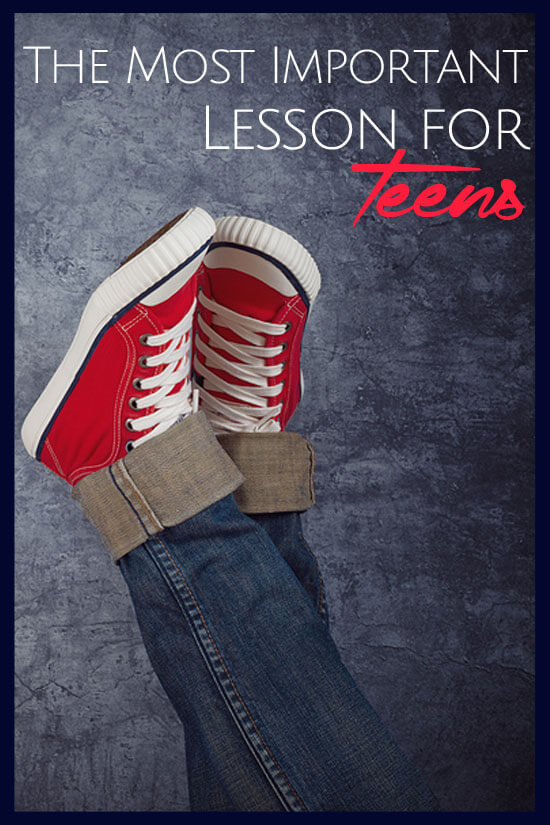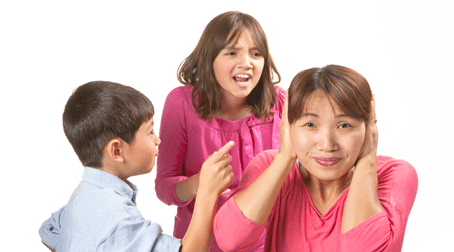The Most Important Lesson for Teens

Recently a friend and I were talking with some teen girls about relationships. “Do you get along with your parents?” we asked the girls. “Yes, but not always,” they said.
We pressed them. “When do you fight?”
The answers came easy: “When I don’t clean my room.” “When my siblings and I argue.” “When I talk back.”
“Why do you do these things?” we asked.
The girls paused. These answers needed more thought. The girls weren’t sure why they do these things. Behaving a certain way comes naturally, but explaining why we do what we do isn’t always easy.
“I fight with my brother because he annoys me.”
“I talk back because I am frustrated.”
“I don’t do chores because I don’t want to.”
Then one girl chimed in and summed it all up for us:
“We’re teenagers! We’re supposed to act this way! We’re angry all the time! We’re lazy!” They all agreed that this was their lot in life, at least for the next few years.
It was disheartening. These were other people’s children, the peers of my teens. I didn’t like that they were describing themselves like this because I don’t see my children this way.
* * *
One of the most important truths in parenting, and one that has stuck with me from the moment I read it is this:
The way you talk to your children becomes their inner voice.
What do kids hear that makes them accept that they are angry and lazy? The teens I know show up to school every day, go to class, do their homework, appear to be clean and well groomed, care for expensive electronics, maintain friendships, have reasonable relationships with adults, juggle hobbies and extra-curricular activities and family time and vacations, and maybe have a moment of snark or a messy room, but for the most part live their full lives well. These are people who carry on lively conversations, are active most days and nights, keep up with hectic schedules, and manage to do it all and stay healthy in the process.
These are not markers of the lazy. Their laughter, carefree attitudes, and occasional silliness do not scream “angry.”
It saddens me that teenagers still receive the message that they are awful to be around, that they still internalize labels like Angry and Lazy. Every new parent has worried about parenting teenagers. Comments like “I’m scared of them” “I’m not ready to deal with their issues”, “I don’t even want to think about the teen years”,“I want to keep my kids little forever” – all are prevalent in casual conversations with anyone who has an opinion on parenting teens.
The truth is that kids adapt and change with age like all current adults have done like we continue to do. As children grow older, they can understand more of what adults understand. It’s something that adults might forget because the process of growing and aging is too close. How many parents take the time to examine who they were as teens and remember how they felt and behaved without the haze of their current hang-ups blurring the view?
Teens aren’t lazy or angry; they are in the process of learning that they are free to make choices apart from the constant monitoring of parents. They have a choice to do chores or avoid them, to argue or agree, to stay silent or express their opinions. Adults don’t have as much control over teens because teens realize more control over themselves. But teens aren’t fully mature yet, and they still need guidance.
* * *
I’ve learned that this is my time to walk closely alongside my teens and not carry them or follow them with arms out ready to catch them when they fall, or drag them along by the hand, or insist on redirecting their behavior. The teen years are the gray area of parenting, the nebulous and one-size-fits-no-one years. They are the important years because they are also the hardest.
As kids get older, they need their parents more than ever.
I’m not a perfect parent. I’ve told my kids to stop being lazy, to shape up and do what they’re told, to cut out whatever behavior is annoying or frustrating me at the moment. I’ve said disrespectful things to them that I later regret, and usually apologize for. I do these things less often as we grow together, as we all get older and wiser. As I realize that they are modeling their behavior on mine, I’ve learned to behave better.
I’m learning to be a better parent to my teens for their benefit and mine. Just as I read baby books and tried out various ways of child-rearing when my kids were small, so am I continuing my education as they get older. As a parent and a person, I am improving. I only have two kids, and that doesn’t make me an expert on parenting or children. I am learning how to raise the two children under my care using the best of my ability and resources, and it is often a trial-and-error process. My goal is to send them from this place emotionally strong and secure, self-confident and sure in their skills, with a sense of who they are in the world and how they can contribute positively to it.
It’s a tall order. I’m not sure that I would have taken the job had I been able to see this far into the future. Normally I’m not up to that big of a challenge if I can clearly see the obstacles ahead. But I took on the responsibility, and I am committed to it.
This means that I will not accept that teenagers are angry and lazy. I will not agree that they are difficult to manage. I do not think that they are alien beings that took over the bodies and brains of former young and cute cherubs. They are great, cool people who are excited to discover something new, who are full of life and the capacity for love, who eagerly try out new freedoms and who can teach me to do the same. I enjoy them immensely. My role is to walk beside them into adulthood, to work out a way to relate to them without being overbearing, to protect them without suppressing, to encourage them when they fall and cheer for them when they get back up again.
And above all, to love them.
My kids need me as their parent; that will never change. I can do a lot for my teens and others who come into my life, but at the core of what I do for them is love them, which is what I’ve always been able to give children of any age. It’s also what I believe they need to hear, especially now. If they get through life knowing that they were loved, then I have done my job well.
The most important thing a teen will learn is love.
READ MORE IN THE FAMILY ROOM
PIN IT FOR LATER:
This post was syndicated with permission to BonBon Break Media LLC.








